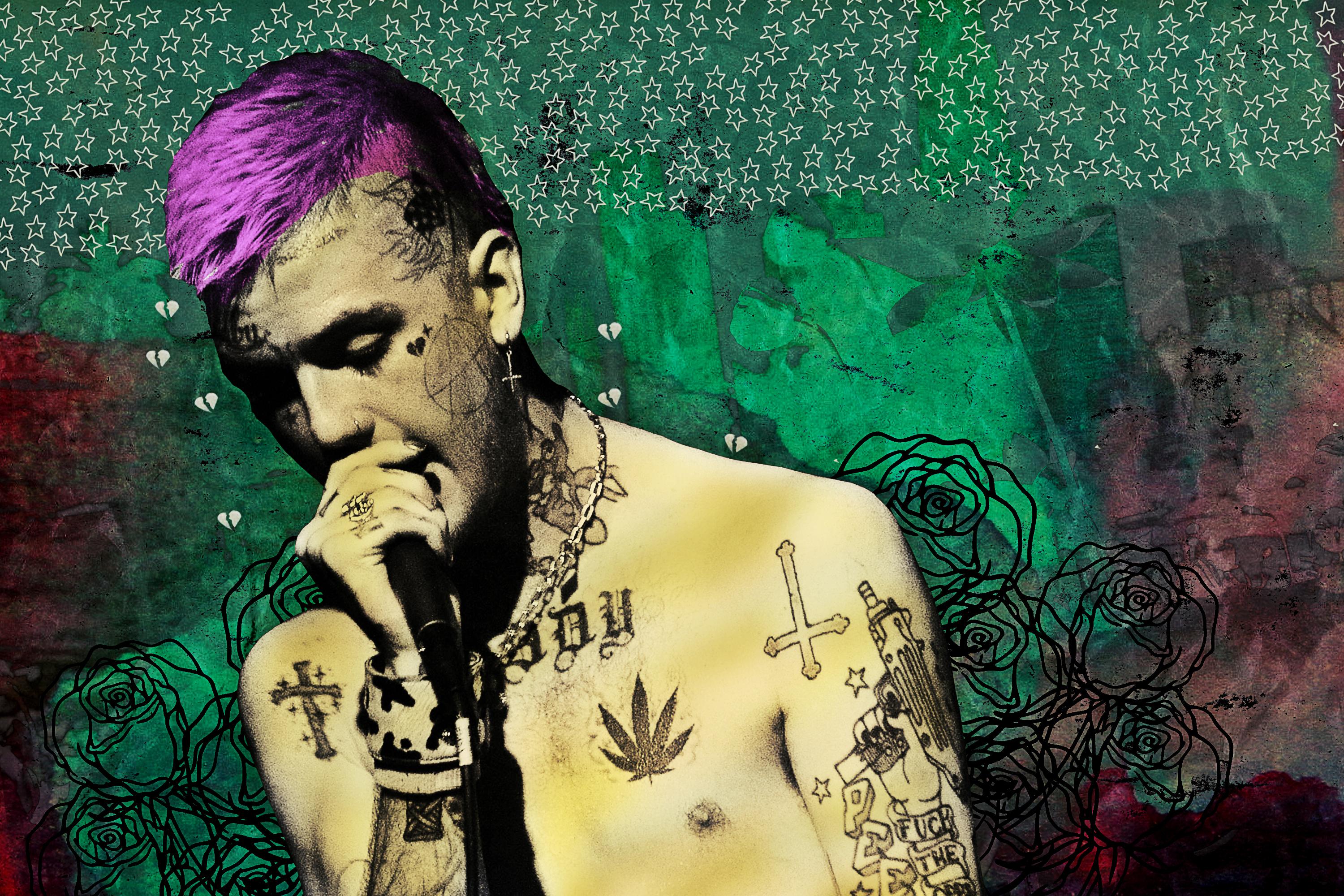
The first thing you’ll notice in the opening moments of Come Over When You’re Sober, Pt. 2, the posthumous album from singer and rapper Lil Peep released this past Friday, is his voice, free and clear in the mix like it never has been before. This is not an accident, and the circumstances that made it possible are heart-wrenching.
Shortly after her son’s death at age 21 from an accidental overdose, Liza Womack visited an Apple store with the laptop Peep used to record, walked up to a clerk, and said, “My son died. This is him. Take this and put it on a new one,” she recalled to The New York Times last month. In life, Peep made music almost exclusively in his bedroom, and he had a penchant for shipping vocals to producers as one track—main harmonies, overdubs, ad-libs, and all—often drenched in reverb and other effects. It contributed to the signature lo-fi, ethereal sound of his early mixtapes, but it limited what his producers could do.
Now, armed with his raw recordings, Peep’s collaborators have had the chance to craft something new—and more vivid—that fits in with his legacy while pushing his music to new heights. Pt. 2 opener “Broken Smile (My All)” makes it immediately clear that they intend to make good on that potential. “I gotta go right now, that’s all,” Peep sings, his wounded voice alone aside from some light piano hits and soft strings behind it. “Nothing to it, don’t expect no call.”
It’s stunning, and slightly uncomfortable, to hear Peep’s voice so naked at the outset of “Broken Smile,” and it sets the tone for Pt. 2. The album, completed mostly after his death, doesn’t shy away from the depression and drug use that sometimes overshadowed Peep’s life and art—in fact, it includes some of the darkest music of his ever released. But on Pt. 2, the vocals pop, the guitars glisten, and the 808s boom more than they ever had in his previous works. It’s a monster of a pop-punk album, and it’s confirmation of what many felt after he died on his tour bus that November night a year ago: If you knew who Lil Peep was, you thought he was a surefire star; if you didn’t, you were about to find out.
“SoundCloud rap,” the catchall term (and occasional pejorative) for the druggy, lo-fi music made by teens and early 20-somethings, has produced a few genuine stars and a few artists as famous for their reprehensible actions as the music they’ve made. Musically, it straddles the line between trap and emo, and its purveyors typically emphasize melody and mood over rapping—at least in the traditional sense.
Lil Peep, born Gustav Åhr, fit perfectly within the SoundCloud rap framework, even if he seemed to operate on a different plane than his peers who pushed the subgenre to mainstream relevance. Peep arrived in 2015 as an Echo Park transplant with bleached hair, a face full of tattoos, and songs that owed more to early-aughts emo than any form of rap that had preceded him. The Long Island native was no one’s idea of a traditional MC, and his lyrics tackled four topics—death, drugs, depression, and girls, sometimes all at once—as only a 19-year-old can. He was a charming dirtbag—sweet, handsome, and vulnerable, with “Get Cake Die Young” inked just below his hairline. He sang horny come-ons in one breath and envisioned his own death in the next. His fans viewed him as more Kurt Cobain than Gucci Mane, but he was influenced by both.
The purest distillation of Peep’s art came on a pair of 2016 mixtapes, Crybaby and Hellboy, released shortly before a Pitchfork profile catapulted him to relative fame. Working with undiscovered bedroom producers such as Smokeasac and Horse Head, Peep built a sonic template that culled from early Bright Eyes, pre-“Float On” Modest Mouse, and acoustic Tom DeLonge jams, pairing them with hip-hop drums to create something that was sometimes messy, but often approached elegance. Take Crybaby’s title track, which Peep and coproducer Lederrick built around a guitar loop from one of the quieter songs in Brand New’s oeuvre. Vocally, Peep oscillates between cocksure and fragile while delivering something less poetic but more exposed than Jesse Lacey did on the track’s forebear (and likely more honest, given the accounts about the Brand New frontman):
I wanna die too, we all wanna die too
I got this vibe, I swear she love gettin’ high too
I love gettin’ high too, I wanna hide you
How did I find you? I’ll be inside, I’m makin’ music to cry to
It’s not entirely accurate to say that Lil Peep’s debut studio album, 2017’s Come Over When You’re Sober, Pt. 1, muted the darkest aspects of his musical persona, though it certainly passed them through a brighter prism. Things hadn’t changed much for Peep subject-wise—representative lyric: “Everybody’s telling me life’s short, but I wanna die” from “The Brightside”—but Pt. 1 was a hookier, more melodic affair than his SoundCloud tapes. Singles like “Awful Things” drew from a richer sonic palette than his previous work and tower over the album, wearing catchy riffs and bad teenage poetry like a stick-and-poke tattoo. “Burn me down till I’m nothing but memories,” Peep shouts on the song, evoking nostalgia for a specific kind of youthful heartbreak best left to the backs of notebooks and LiveJournal entries.
Pt. 1 was a minor commercial success, reaching no. 38 on Billboard’s album chart, but its impact reverberated: Peep was the new face of emo with a preternatural gift for songcraft. He wasn’t yet famous enough to be the capital-V Voice of His Generation, but he spoke and sang openly about his own depression, attracting hundreds of thousands of fans at a time when young people were learning to talk about mental health through the internet. And it didn’t hurt that he also looked at home on the runway. He was poised for huge things, something he was acutely aware of when he told Pitchfork in 2017, “In a couple of years, I’ll be a household name. Everyone’s going to know who I am.” All of this only added more heartbreak to his November 2017 death, which the Arizona medical examiner eventually attributed to an overdose from the medications fentanyl and alprazolam. That he sang about the very things that killed him raised difficult questions about the relationship his fans—and those closest to him—had with him and his music.
Those issues haven’t gone away on Come Over When You’re Sober, Pt. 2, a heavier affair than its immediate predecessor. Helmed by Smokeasac and industry veteran George Astasio, the album is built from those bedroom sessions that Womack had transferred onto a new laptop. Ghosts loom large over this project—he’s haunted by exes, lines of cocaine, suicidal thoughts—and none larger than Peep himself. Take “Runaway,” an advance single from the project with a video codirected by his mother. The song finds Peep at his most isolated: retreating from his problems (sometimes physically, sometimes through drugs) and frequently revisiting the line “Everybody so fake.” “Why the fuck do everybody act like they care? / I was dying and nobody was there,” he sings on the chorus.
Any joy found on Pt. 2 is fleeting. On “Leanin’,” Peep coos, “Pop that pussy for me right now” to his muse before screaming “I was trying to die last night / Survived suicide last night” 22 seconds later. “Sex With My Ex,” an older fan favorite that appears here in a more cleanly mixed form, has Peep at his most self-aware, acknowledging that he and his former lover only have this arrangement because “she’s afraid of what comes after me: true love.” The guitar line of lead single “Cry Alone” is as radiant as any mid-’90s grunge hit, but it belies the darkness of the lyrics, which find Peep taking drugs, drinking lean, and wanting to burn his old high school down.
This all plays out among the lushest backdrops of his catalog, which are enhanced by Peep’s cleaned-up vocals (which Smokeasac discussed at length with Complex last week) and his producers’ instrumentation, which is more dynamic here than it had been on his previous releases. The indie rock and emo samples that defined his early work are virtually nonexistent. In their place, Astasio’s guitar work comes fully to the forefront and pushes the music to new places. You can trace the evolution through songs like the aforementioned “Leanin’,” which leaked in an early form this past June. The Cure-indebted bassline of the original is replaced by an acoustic guitar and atmospherics. There’s a chasm between the two versions; the new “Leanin’” is bigger and brighter, and despite some fans’ protestations, the revamped song truly comes to life here.
Perhaps the biggest and brightest song on Pt. 2 is also its most controversial—and likely its best from a pure pop perspective. “Falling Down,” which appears on the album as a bonus track, is a collaboration between Peep and XXXTentacion, a burgeoning SoundCloud rap superstar who was shot to death in June at age 20 and still dominates Spotify’s charts despite the heinous crimes he was charged with while alive. The song, which was certified gold by the RIAA in October, came together after Peep’s death. (X, who says on an interlude toward the end of “Falling Down” that he didn’t check Peep out until he died, recorded his verse shortly before he was fatally shot.) It’s been a source of contention among Peep’s fans and collaborators, some of whom say that Peep outright rejected X while he was alive because of the latter’s treatment of women.
It’s an ugly backstory to a beautiful song that hints that Peep was ready to make good on his promise to become a household name—and possibly ready for new themes to enter his art. “Falling Down,” Peep’s highest-charting song, came out of the sessions he had with idol-turned-collaborator iLoveMakonnen after he relocated to London shortly before his death. Those closest to him say that this period marked a turning point toward a happier, more at-peace Lil Peep. (“We were so happy that it was impossible to make a sad record,” Smokeasac told the Times.)
He sports that newfound optimism proudly on “Falling Down”: “Come, let’s watch the rain as it’s falling down,” Peep sings on the hook, sounding somewhat hopeful about love, and possibly life, for maybe the first time on a song. There’s a hint of melancholy in his voice—it’s still a Lil Peep track. But he’s floating here, at home on a sunny, uptempo beat. The reverb, overwhelming darkness, and difficult questions that come with listening to his music are pushed aside just enough to let his voice be heard as it should’ve been before his light was snuffed out too soon—clearly, and loudly, as an ascendant pop star.

